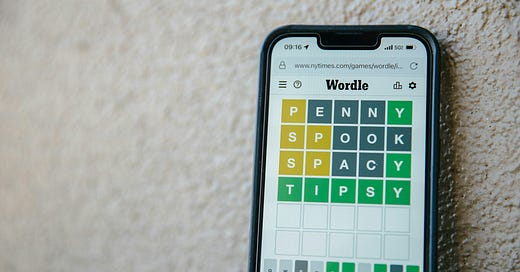Games People Play
My perpetually fuzzy recollection is that the old television Superman (played by George Reeves) once said to a notorious bad guy trying to make a deal to avoid arrest that “Superman doesn’t play games.”
Of course, maybe he just said Superman doesn’t make deals, but Great Caesar’s Ghost, if Superman did not say that he doesn’t play games, he should have.
People were not bright enough to play complicated games back then, proof being they never figured out that Superman’s entire disguise as Clark Kent was to take off his daytime pajamas and cape and put on a pair of glasses.
Although not a man of steel myself, I also do not play games.
I do not play board games, card games, party games, trivia games, word games or any other games. No monopoly, poker, Trivial Pursuit or Scrabble, not even chess or checkers. I will not in a house. I will not with a mouse (you get the idea).
Or as my wife Robin says, I’m no fun.
And yes, that means that I do not play Wordle, the unbelievably popular online puzzle game created by software engineer Josh Wardle, bought by the New York Times, required for inclusion in most adult conversations, and monopolizing people’s already limited attention spans.
The idea behind the puzzle is that you have six tries to guess that day’s five-letter word while using your own choice of four-letter words if things do not go as planned.
After each guess, the tiles showing the letters that you have chosen change colors to show which letters are not in the word, which letters are in the word but in the wrong place, which letters are in the word and in the correct place, and your horoscope indicating that you are absolutely in the wrong place and going nowhere fast.
At that point, my head would be spinning and I would be feeling a bit dizzy. That is, if I were playing.
That great arbiter of proper etiquette, Larry David, indicated on his television show Curb Your Enthusiasm that it is the lowest form of depravity to give away that day’s Wordle answer. In fact, in some states giving away unwanted Wordle clues is a class B felony.
The game originally blossomed during COVID by helping people connect while isolating and ready to try anything other than having to spend more time with their loved ones, and since then Wordle has continued to create connections across geographical and generational divides.
In our family, where everyone except me plays Scrabble as a blood sport, Wordle has been a bit hit. Robin gets daily reports from our grown sons, her brother and even her 92-year old mom on their Wordle progress.
Her mom, a.k.a. “Nama” (yes, yes, Nama since she is way too cool to be called Grandma), readily joins the mandatory trash talking.
Robin: “How’d you do today?”
Nama: “I started with ‘aside’, and had the ‘i’ and the ‘d’ but in the wrong place, but I got it in three.”
Robin: “That’s great Mom! I got it in four.”
Nama: “You only got it in four? Hmmm, I got it in three. How did it take you so long?You only got it in four?”
She all but said “ I’m 92, but look who’s getting senile!”
The Times bought Wordle to drive up subscriptions and increase advertising revenue but enough already.
Now there are endless other games at the Times, Spelling Bee (how many words can you make with seven letters), Connections (group words that share a common thread), and Letter Boxed (create words around a square).
When my extended family finishes Wordle, they are off to Spelling Bee, which affords a different status at various levels of achievement, such as “Great”, “Amazing”, “Severely Challenged”, and the coveted “Genius.”
Robin’s brother wakes up at 6:00 am to get a jump start on Wordle and will not get out of bed until he achieves Spelling Bee Genius status. Some days he only emerges at dinner time.
There are others horning in on the action and now other games are proliferating separate from the Times, such as Nerdle (a daily math Wordle for the truly nerdy) and Worldle (guess the country based on the map image for people who clearly want to know that they are in the right place).
Even the New Yorker has come up with their own pretentious trivia game called Name Drop, which “tests your knowledge of fascinating people” based on a series of six clues. When are fascinating people ever actually fascinating?
Since times are tough and money is tight at the “failing New York Times”, the editors and Mr. Sulzberger have asked me to come up with some new games that might attract a broader audience from the non-game playing public than can be imagined by the narrow imaginations of the game loving lamestream media.
Nama invites you to play but says “Try and keep up. You got nothin’.”
Curdle. Six tries to guess the most overripe article of food in my refrigerator. Extra credit if your selection can move on its own.
Prattle. Attempt to guess how to say the day’s Wordle offering in various foreign languages. This game is closed to Americans since the vast majority of us only speak English and even this we do poorly.
Flirtle. Select which pick-up line is most likely to get you a date and which will get you cancelled on social media (hint: your favorite pick-up lines did not work when you were younger and will not work now).
Tattle. Submit salacious gossip from your personal life in the hope of being selected as the day’s winner. Points deducted if you are dumb enough to include gossip involving your spouse.
Turtle. My favorite, where you hide inside your shell, cozy and warm, and ignore the whole game thing until it goes away!




